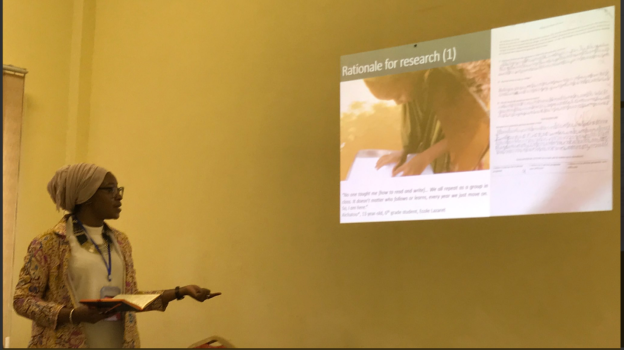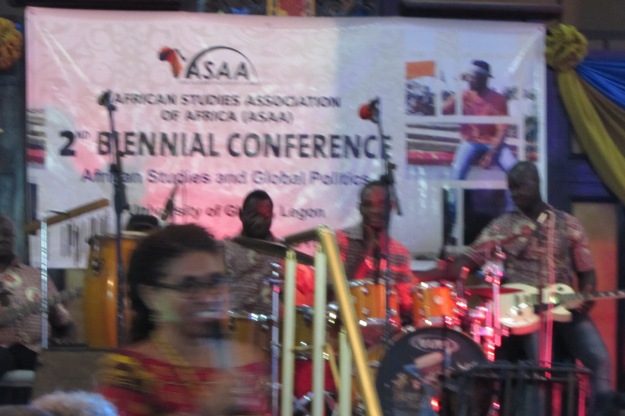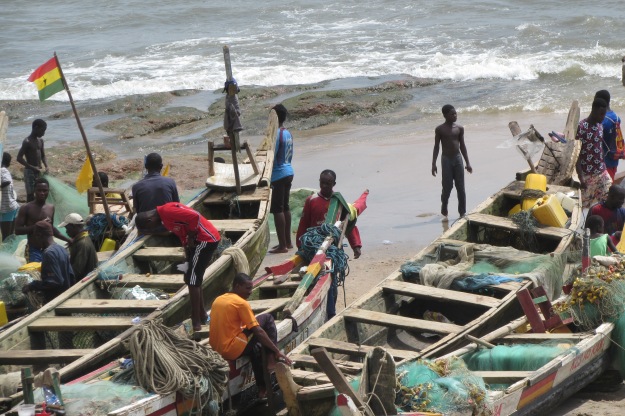We have continued to reflect on the important work recently presented at the second bi-annual conference of the African Studies Association of Africa (ASAA) hosted by the Institute of African Studies (University of Ghana, Legon) earlier this month (see Ndeye Ami Diop’s recent piece here; some media coverage on the ASAA here; highlights from the opening day here; and background on the conference here).
In this post, we share reflections from the conference that were recently penned by PhD candidate in Development Studies, Halimatou Hima, a Cambridge-Africa Scholar at the University of Cambridge (UK).
We repost below Ms. Hima’s piece which first appeared on her blog, and invite you to comment with your responses and thoughts.
Featured image credit: Halimatou Hima
***
African Studies Association of Africa (ASAA) in Accra, Ghana, October 2017
By: Halimatou Hima
In terms of the pertinence of the debates, this was probably one of the best conferences I have attended thus far. In an era where discourse on decolonising academia is rightfully ever-present, this conference held at the University of Ghana, Legon in Accra does just that. Delocalising an African Studies conference back to the continent is in itself a revolutionary act. The field of African Studies had historically been (re)invented to look at Africa using a socio-anthropological and ethnographic lens to benefit and further the colonial agenda – sometimes distorting, ignoring, silencing, or simply failing to understand local knowledge systems. Scholars have contested this view by adding their voices to the field but also by questioning its very premises and redefining what it means to engage in ‘African Studies’. Africans writing about Africa and global affairs from gender issues to geopolitics predates the reinvention of the field of ‘African Studies’ as evidenced by the writings of Nana Asma’u Fodio, for example.
This 2nd biennal’s theme was “African Studies and Global Politics“. The panel I sat on was entitled “Challenging, Deconstructing and Reimagining Educational Systems: cases from Ghana, Niger, Nigeria and South Africa”. Our panel proposes to explore the past and ongoing shifts in educational systems across the African continent. Who gets access to formal education? Who gets excluded and why? In what ways are new forms of knowledge being generated, contested, or recognised? What policies affect the dynamics of social and economic change in a manner that (de)center theory towards contextualised practices that favour learning? In grappling with these questions, this panel has invited reflections on the idea of quality education, power and privilege in education and by extension engages with the politics of knowledge production.

Here are three key points that I found particularly interesting during this two-day conference:
Point 1: Active participation with engaged conversations
All the panels I attended were followed with really insightful conversations. In one panel entitled “Politicising debates on gender and gender”, two speakers (both PhD candidates) gave talks on respectively gender & early childhood in Rwanda and women & electoral politics in Nigeria. The discussion that ensued gave insights into how accounting for contextual epistemologies could expand the field with novel theory.
If Nigerian women, as the presenter suggests, were not ascending to “high-level” electoral positions, why couldn’t their form of participation be theorised as valid participation? Why does the participation need to be perceived in a one specific lens in order to be valid? On the case with early childhood in Rwanda, it became clear, by the end of the discussions, that unless economic structures changed, gender roles in child care would remain unchanged and static. An interesting twist that the conversation took was the expression of love as a culturally-driven phenomenon… How many African parents tell their children, ‘I love you’? I would guess not many. Does that mean that they don’t love their children? Of course, not. One participant (a social worker in Norway) spoke about how a check-list approach to measuring affection has led to many crises within families: some African families that had migrated to Western Europe had had serious issues with childcare services because their expression of love did not match that of the context they had migrated to.
When panels ranging from justice to feminism leave you thinking days after the conference has ended, then you know it has been worth it. It was refreshing to be in a space where seminal scholars such as Oyewumi, Alidou, Steady, and Nnaemeka were firmly seated in the theoretical space that they deserve.
Point 2: Focus on publishing
I very much appreciate the conference’s sessions on publishing including the roundtable on the Journal of African Affairs. Dr. Peace Medie of the University of Ghana is the first African editor of this highly-ranked journal. In her presentation, she encouraged participants, specially based on the African continent, to submit papers. She highlighted rightfully so that the relative underrepresentation of Africa-based scholars in top tier journals has little to do with lack of talent or originality but rather with the limited access to information about processes for publishing and other logistical matters that could be dealt with. Even the best articles rarely pass the review process without some readjustments and changes – knowing what to expect when one decides to submit an article is also a step toward persevering until that article gets published. There were further issues raised about access to journals, power, and the politics of funding… a whole other issue.
Point 3: A celebration of Ghanaian creativity
The conference ended with a gala with live music – the apex of the night was this old couple (probably 80+) dancing and swinging solo as if they were just 18 and in love. At the end, all participants including top scholars and those of us still struggling with PhDs joined in and danced away the night. It was a beautiful way to end what was a rich and enriching conference where I have made valuable links with fellow PhDs in universities across Africa (such as University of Ibadan) and worldwide!

And talking about creativity, one of the participants and organisers (Abena) wore this gorgeous dress that looked like it was made in heaven before it descended on earth to fit her and no one else. My friends and I asked her, “please sistah, you look divine. Where can we get that dress?” Before we knew it, Abena had called an ankara aunty and connected us with Mary, the woman with golden-hands. Mary makes dresses that seat harmoniously with the body – she said it herself, “this is what I was born to do, and I am happy when I make dresses.” What a talented woman. With all said and done, the most memorable part of the conference was how Ghana felt right like home, no need for artifices or code switching or masks – a place where I shared moments with Cantab friends and colleagues from Cape Coast to Elmina to Shitor Ave, connected with new people and old friends now living in Ghana, met with friends’ family members, and engaged in lively conversations with strangers in taxis with in the background, the always-loud and nice Gospel songs on the radio.

Point *bonus*: No sandwiches or finger food, real food (jollof, yam, palm oil stew, plantains, and more) every single day
I am grateful to the Centre for African Studies at Cambridge University that made my participation at this conference possible and to the organisers for such a remarkable gathering.
